|
|
This is the section of the book where Peter Balakian has a
field day in bringing events up to the present, utilizing all the many new sources and
developments that affirm the Armenian “Genocide,” thanks in large part to the
Armenians’ hypocritical allies, the “genocide scholars.”
We begin with a quote by Terrence Des Pres: “If the Holocaust was a hoax, why not the
Armenian catastrophe also? If Anne Frank’s diary was faked, who is to say that certain
documents signed by Talaat Pasha weren’t forged as well?…”
No Turk says the Armenians did not suffer a catastrophe. It was a catastrophe of their own
making, by firing the first shot and
rebelling against their own nation, where they had prospered for many centuries. The Turks
suffered no less a catastrophe; more Armenians massacred Turks than Turks massacred
Armenians. If Terry wishes to find a better parallel to the Holocaust, he may wish to keep
in mind the following words from the "The Jewish Times” (June 21, 1990):
"An appropriate analogy with the Jewish Holocaust might be the systematic
extermination of the entire Muslim population of the independent republic of Armenia which
consisted of at least 30-40 percent of the population of that republic." (2006 ADDENDUM: According to the Great Soviet Encyclopedia of 1926, Azeris
constituted over 38% of the
population of Armenia, in 1918. Today, Armenia is some 98% "pure.")
If the Holocaust was a hoax, why not the Turkish catastrophe also?
If Terrence Des Pres believed the Talat Pasha telegrams were not forged, it's unfortunate
for his reputation that he must forever remain on record as an embarrassingly amateurish
analyst.
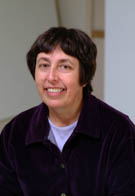 |
|
Judith
Herman |
Balakian offers a description of criminal behavior from
Judith Herman (“Trauma and Recovery”), in an attempt to lend weight to what
Armenians like to call “The Turkish campaign of denial”: A criminal likes to “promote
forgetting.” “Secrecy and silence are the perpetrator’s first line of defense.” If
that fails “the perpetrator attacks the credibility of his victim.” Otherwise, there
is an attempt to make sure “no one listens,” by, as Balakian writes, “either
blatantly denying or rationalizing his crime.”
It sounds like Judith Herman has hit the nail on the head, regarding the methods of the
Armenians!
Balakian insists the Turks “planned the genocide.” Peter, you have failed in
presenting any legitimate proof in your entire book. Hearsay stories of suffering people
aside, testimonies of Morgenthau, missionaries, Bryce and others with conflicts of
interest aside… you have failed to prove the Ottoman government planned an extermination
policy. What you need are solid documents like the Talat Pasha telegrams… but you must
make sure such documents are real. Just like what I’m doing with your pathetic book,
exposing all your misrepresentations and falsehoods, if you want to make the world believe
these telegrams (for example) are genuine, then you must take the proof against their
legitimacy and try to disprove them. Just giving us your by-now-extremely-questionable
word cannot cut the mustard.
Going on to present phony quotes from “Ambassador Morgenthau’s Story” on pg. 374 as
you have done does not prove anything. If “Talaat and Enver admitted their plans to
exterminate the Armenians,” why did the British not quickly close the book on the
Malta Tribunal? Morgenthau’s ghostwritten book came out in 1918, before the Malta
Tribunal even started. The British could have wrapped their case up by the following year,
in line with the phony Ottoman kangaroo courts… well before they had a chance to become
war-weary or needed to get back their prisoners-of-war, as you attempted to make your
reader believe.
In criticizing Talat Pasha’s memoirs (partly published in the New York Times Current History; I
still don’t understand how anyone could get their hands on his private memoirs, but I am
assuming they are true), you say “Talaat’s strategy was to scapegoat the Armenians by
claiming that the Russians used the Armenians to help them invade eastern Turkey.”
In describing Judith Herman’s points above, you wrote the behavior of a criminal
includes “either blatantly denying or rationalizing (the) crime.” Now, it’s bad
enough for people to see you as a latter-day Cardashian, saying anything and everything
regardless of the facts… but now you’re getting uncomfortably close to Judith Herman
territory. There is absolutely no doubt what Talat wrote was the truth.
The proof lies even in Armenian sources, as with the following Dashnak committee order: "As
soon as the Russians have crossed the borders and the Ottoman armies have started to
retreat, you should revolt everywhere. The Ottoman armies thus will be placed between two
fires. On the other hand, the Armenians in the Ottoman army should desert their units with
their weapons and unite with the Russians"
Since Mr. Balakian provided the silly opinions of Terrence Des Pres, it is only fitting I
should call upon the testimony of another with a similar “middle name”: Philippe de
Zara (“Mustapha Kemal, Dictateur,” Paris, 1936).
“…How can anyone deny that, in the opinion of the Turks, according to the law of
all the states, the conduct of the Armenians, facilitating during the war the task of the
adversary, can be recognized as anything but a crime of high treason?. . . The committees,
divided among themselves for internal issues, were often in agreement to facilitate the
advance of Russian armies: they were attempting to obstruct the retreat of Turkish troops,
to stop the convoys of provisions, to form bands of francs-tireurs. Mass desertions took
place in the Eastern provinces: Armenians thus formed many troops officered by Russian
officers… The culpability of Armenians leaves no doubt.”
Balakian: A secretary of state under Herbert Hoover helped align his nation’s policy
by drawing closer to Turkey on the basis that Turkey is not doing anything to undermine
American interests. James Barton suddenly became “pro-Turkish” by trying to “keep
the Turks looking west and away from the communist threat.”
These people were thinking of the big picture, and of America’s welfare. Perhaps
Armenian-Americans don’t understand this, but if they are living in America, the welfare
of their nation must generally supersede the interests of any other nation. Who could
argue it was important to have a tough nation like Turkey to keep the Soviets in check?
Europe slept more soundly, knowing that “big brother” Turkey was there to powerfully
counter the Soviets, in case of an invasion. Would Peter Balakian prefer Turkey to have
joined the Soviet Union, just as Armenia willingly did?
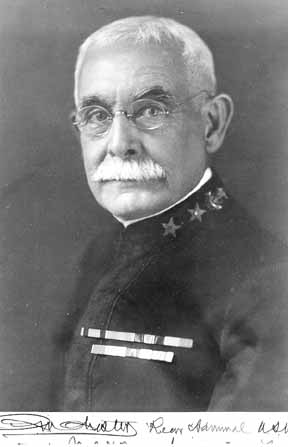 |
|
Rear Admiral
Colby Chester
Would you buy a used
car from this man? |
Then it’s time to denigrate Rear Admiral Colby Chester,
as so many pro-Armenians similarly attempted to defame when he was one of the few voices
to write an objective article not based on the typical propaganda. Chester had a business
concern in the Ottoman Empire, forming a valuable bridge between America and a nation that
would prove herself to be among America’s most stalwart allies in years to come… and
the Armenian “attacks the credibility of his victim” (in one of Judith Herman’s
points to describe criminal behavior), by trying to find a connection between capitalism
and dishonesty. The reader can examine the
admiral’s words and determine his credibility. Admiral Chester and his son were one of the very few Westerners who learned
the real story behind the Turks, and their business interests have nothing to do with
their desire to honestly convey what they perceived as the truth.
The same reason has been used to try and discredit Admiral Bristol, as well. However,
think about it. If Chester had already set up shop (the greasy Cardashian worked for this
shop before the war, Balakian attested earlier), how desperate would the admiral have
needed to be to sell the world on how great the Turks were? Few businesspeople out to make
or save a buck will question the origins of the goods. China, for example, is a repressive society, despite the image of
modernization we have been fed. How many of us refuse to buy goods from China? All we look
at is the dollar tag.
Balakian tells us, “By 1922 Chester, hoping to see his promised oil rights come to
fruition (wrote his propagandistic article in the New York Times Current History).”
I don’t know where Chester’s “promised oil rights” were, and I don’t know if
Peter Balakian knows either, since no source has been provided. Assuming Chester had
promised oil rights, what I do know is that they could no longer be in Turkey, since
Turkey had all of her oil fields taken away at the end of the war. Therefore, there would
have been no reason for Adm. Chester to have written his article, except to present the
truth, and nothing but the truth.
Balakian presents the following excerpt from Chester’s article in order to prove how
ridiculous were his claims: “The Armenians were moved from the inhospitable regions
where they were not welcome and could not actually prosper, to the most delightful and
fertile part of Syria….where the climate is as benign as in Florida and California,
whither New York millionaires journey every year for health and recreation. All this was
done at great expense of money and effort, and the general outside report was that all, or
at least many, had been murdered.”
(Chester continued: “In due course of time the deportees, entirely unmassacred and
fat and prosperous, returned [if they wished so to do], and an English prisoner of war who
was in one of the vacated towns after it had been repopulated told me that he found it
filled with these astonishing living ghosts.”)
Compared to the propagandistic horror stories Balakian has presented, this version
certainly sounds unbelievable. However, it’s not enough to say, “this can’t be true.”
In order to make his case, Peter Balakian has to prove it’s not true.
However way he tries to do that (and he won’t, because he can’t; that’s why he must
do the next best thing… try to destroy Admiral Chester’s character, Armenian-style), I
can take individual excerpts and see if I can back them up. The part about “great
expense of money and effort” was true. The bankrupt Turks apportioned 265 million kurush
for the relocation program. Some corrupt locals taking advantage of these resources aside,
why would the Turks have spent so much money and resources while desperately fighting for
the nation’s life, against mighty world powers on multiple fronts? If the idea was to
exterminate the Armenians. why not do so on the spot or nearby, after collecting the
villagers, in the same manner the Armenians did when they massacred 500,000-600,000
Turks/Muslims? (Ara Sarafian had issues with the amount in question, from Kamuran Gurun’s
The Myth of Innocence, and I investigated further in “An Armenian Tangles with an Armenian.”)
For example: "Armenians
boasted of having raised an army of one hundred and fifty thousand men to fight a civil
war, and that they burned at least a hundred Muslim villages and exterminated their
population." (G. Hamelin, Les Armees Francaises au Levant, February 2,
1919, Vol. 1, p. 122) [2006 ADDENDUM: I might have had a good
reason to point to that source, but it seems to be in error, as the source appears to be
Prof. John Dewey, and his 1928 article.]
The Turks needn't have bothered with the expensive relocation. So as not to upset nearby
Muslim citizens, the killers could have moved the Armenian villagers only slightly away,
and executed them on the spot, with a burial detail not far behind. Similar to what the
Armenians did (except they killed on the spot, and didn't bother with digging graves).
As far as whether Armenians could have actually become “fat and prosperous,” allow me
to present an excerpt from Balakian’s hero, Ambassador Morgenthau himself! A September
1915 diary entry revealed:
"Zenop Bezjian, Vekil of Armenian Protestants, called. Schmavonian introduced him;
he was his schoolmate. He told me a great deal about conditions [in the interior). I was
surprised to hear him report that Armenians at Zor were fairly well satisfied; that they
have already settled down to business and are earning their livings…”
(The “one half million” displaced was the same figure used by Arnold Toynbee in his
propagandistic April 1916 work, “The Treatment of Armenians in the Ottoman Empire,”
when Toynbee referred to Armenians still alive. What a funny way to run a genocide, huh? (2006 ADDENDUM: See also Consul J. B. Jackson's Feb. 1916 figure of 486,000, "according to best
information." According to Vahakn Dadrian,
"in 1916... the genocide had all but run its course.")
One of Judith Herman’s characteristics for criminal behavior: “Secrecy and silence
are the perpetrator’s first line of defense.” Balakian no doubt came across the
above passage written in Morgenthau’s own words, yet he preferred to keep quiet about
it. Nowhere in his book is there mention of this other side of the coin.
This is not to say many Armenians did not suffer and some did not die. However, we can
ascertain conditions were not horrible for all of the Armenians who were relocated. Nobody
is saying Armenians were having a picnic…. but Turks were not having a picnic either,
with thousands dying daily of starvation, for those who prefer "Ambassador
Morgenthau's Story" as a source.
|
|
Balakian then finds fault with MGM’s
buckling under the pressure exerted by the Turkish ambassador, Munir Ertegun,
halting plans to film Franz Werfel’s The Forty Days of Musa Dagh. Balakian labels
this as “a foreign government censoring artistic freedom in the United States.”
Those who don’t care for “Mein Kampf” (which likened Jews with subhuman
vermin; “Forty Days” likened Turks with subhuman savages) may be pleased justice
was served. The book has caused considerable damage, by blowing the minds of those
like Vahakn Dadrian, who devoted his life to deception and defamation of Turks as a
result. Yossi Sarid, 2000’s Minister of Education of Israel, said, “The Forty
Days of Musa Dagh.... was translated into Hebrew in 1934, and influenced many young
people in Eretz Israel including me." Mr. Sarid then proceeded to corrupt a new
generation by actually putting this hateful fiction on reading lists. Rabbi Albert
Amateau testified Franz Werfel was duped by the Armenians, and was ashamed — but
too afraid of Armenian terror — to refute the work.
Balakian takes occasion to remind us of the Hitler quote, for the second time in his book. I tell you, if it
was not for Der Fuehrer, and a statement the Armenians most likely attributed to him
(as they did with another “Hitler,” Talat Pasha; only Talat was more Hitleresque,
in the Armenian view. The real Hitler was a hero many Armenians fought for,
including the 20,000 led by Dro), the Armenians would have practically no proof for
their beloved genocide, whatsoever.
“A 1959 statement by the press attaché of the Turkish embassy in Washington
pointed out what the Turks did to the Armenians was ‘what might have been the
American response, had the German-Americans of Minnesota and Wisconsin revolted on
behalf of Hitler during World War II'.” Had such an event transpired, the
American people and government would have been so outraged to find their fellow
Americans massacring their relatives and betraying their country, I wonder if there
would have been many German-Americans left alive for a “deportation.” (This
exceptionally thought-provoking statement was brought to us courtesy of Richard
Hovannisian, in a 1986 article entitled, “Patterns of Denial.” Thank you,
Professor!) (2006 ADDENDUM: The reader is advised to consider what Ambassador Morenthau himself made
of the exact same scenario.)
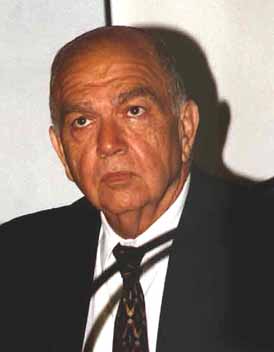 |
|
Richard
Hovannisian |
The latest wave of Armenian Genocide
mania began in 1965, as Armenians around the world publicly commemorated the
fiftieth anniversary of their identity-affirming date to celebrate. Resolutions were
passed in different countries. Spyros Kyprianou of Cyprus ignored the
Turkish-Cypriots he was supposed to be representing by speaking of the “mass
murder of a million and a half Armenians” in the United Nations. The governor
of Armenian-loving Massachusetts, along with others, issued proclamations.
Congressman Gerald Ford marked “the 50th Anniversary of the Turkish genocide of
the Armenian people,” in Congress. Ford the Historian would lose his presidential
re-election years later, mainly by making a historical remark about the Soviet Union
that had no basis in reality (to the tune of there being no Soviet domination of
eastern Europe), during his 1976 debate with Jimmy Carter.
Balakian revels in his movement’s getting fresh vigor from the world community,
producing new waves of what his people thrive on the most: Sympathy. In his
blindness, he fails to recognize the collateral damage produced by harping on ill
events of the distant past… the new generations being bred to hate, leading to
violence ranging from bombs and bullets to unscrupulous reputation-destroying smear
campaigns.
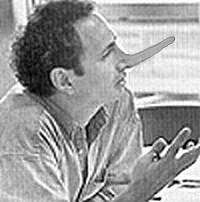 |
|
Peternocchio |
Balakian is outraged that the Turkish
government did not take these charges lying down… as with reminding the press not
to unfairly use the word when a state-sponsored genocide has yet to be proven, and
that “the Turkish side” be accorded equal time. (That latter one has rarely been
respected.) “Using diffuse, evasive rhetoric aimed at subverting the truth
(Brother! Spoken by a true champion of “truth”… I’m surprised Peternocchio
does not spell this word in four letters),” terms such as “the alleged Armenian
Genocide,” “civil war,” and “intercommunal warfare” displayed the Turks’
evil ways with which to cover this episode up. (Balakian thinks of “intercommunal
warfare” as “Orwellian doublespeak”; however, when internal communities are at
war, why would that not be called “intercommunal warfare”? That is fairly
straightforward, and there is nothing ambiguous or evasive whatsoever.)
The author objects to the death toll
ranging from 300,000-600,000 … maybe this is why he is an English teacher, and not
one in mathematics. Once again, figure it out: A dozen pre-war pro-Armenian
population estimates ranged from one million (1912 British Blue Book) to 1.6 million
(Lepsius); only Armenians claimed population figures exceeding 2 million. One
million Armenians survived, even according to Peter Balakian. The ones who died did
not all die from massacres, but from all causes. (2006
ADDENDUM: For example, a whopping near-150,000 died with no Turks in sight, as provided by Richard
Hovannisian.)
He would rather go with the 800,000 the Turkish minister of the interior declared
during 1919, when that puppet and kowtowing minister of the interior was under
Allied occupation, and under the gun by British authorities to find damning massacre
evidence or be damned at the upcoming peace conference. (The Turks were damned with
the Sevres Treaty in any event.) The previous minister of the interior had estimated
300,000. (2006 ADDENDUM: I am no longer certain about that
last claim. Kamuran Gurun's rationale for the 300,000 mortality figure may be
read here. The 1926 edition of The
Great Soviet Encyclopedia also concurred, with 300,000.)
Balakian actually has written, “To make matters worse this virulent campaign of
Turkish denial provoked some angry Armenians to violence,” beginning with the 1973
assassination of two Turkish diplomats by a crazed elderly Armenian who had betrayed
his nation to join with the invading Russians… which led to a wave of Armenian terror lasting until the 1980s. Whatever
wrongs the Armenians commit… true to form… they blame the Turks.
Could that be another one of Judith Herman’s characteristics of criminal behavior…
when the criminal blames the victim?
Since the crime of genocide against the Armenians has yet to be proven, of course
“genocide” will be denied.
When will the Armenians ever face up to the responsibilities of their actions? Peter
Balakian cannot blame anyone for the actions of Armenian murderers than the
Armenians themselves. Is Mr. Balakian actually condoning these murders, because of
“Turkish denial”? Since the establishment of the “Soghoman Tehlirian Defense
Fund” which helped the killer of Talat Pasha get away scot free (thanks to the
purchase of brilliant legal talent, German fears of being implicated in
"genocide," and German prejudice), the Armenians have believed in
defending the murderers among them. Similar defense funds were set up for more
contemporary Armenian criminals, such as Hampig Sassounian (his retrial) and Mourad
Topalian. The top Armenian holy man actually honored the mass murderer Dro, when his
remains were flown to Armenia. Amazing.
Amateur Analyst Terrence Des Pres charges Turkey had asked the U.S. to ignore its
own official archives (not everything; there is some valid stuff in there, like the
reports of Bristol and Niles and
Sutherland. [12.9.1919,
184.021/265] reveals a British colonel reporting that the Armenians “massacred
between 300,000 and 400,000 Kurdish Muslims in the Van and Bitlis districts.”
Honorable people just don’t like propaganda to be presented as fact, and that is
what the Turks were reminding the Americans of. 2006 ADDENDUM:
Most powerfully, the State Department had opened these archives to the British in
1921, on condition that the source not be revealed — indicating the embarrassed
Americans knew how shoddy the material was — and the British themselves concluded,
in a July 13, 1921 message: "I
regret to inform your Lordship that there was nothing therein which could be used as
evidence against the Turks who are being detained for trial in Malta,"
revealing that everything boiled down to "personal opinions" and "no
concrete facts"), and had coerced the U.S. and the media into hearing
the Turkish side.
“This is turning intellectual debate into a gimmick for the use of the
powerful.”
Terry, if you can hear me: the powerful in this equation are not the Turks. The ones
with the money and the power are the Armenians. Otherwise, how can dishonest books
like “The Burning Tigris” be published when there are practically no
books given wide distribution representing the other side? Sam Weems’ “Armenia”
only came out in 2002, and the book is so unavailable, Amazon.com is selling used
copies for almost $200.00, at the time of this writing.
One can only have “intellectual debate” if both sides of a story are explored,
not just one. Even a schoolchild can tell us that, in case we forgot to eat fish for
dinner.
And that goes equally for Richard Falk quoted in the next passage on p. 380, who at
times can be among the most strangely shrill and unreasonable among the hypocritical
“genocide scholars.” (Although there are indications he might have cooled off in
recent years.)
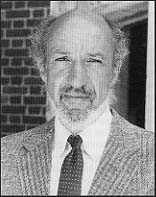 |
|
Richard
Falk |
Why does Richard Falk and, to a lesser
extent, Terrence Des Pres sound so hysterical? What is the reason to become so
emotional? If they consider themselves professionals (although how the latter can be
classified as such if he actually believes in the validity of Andonian’s crudely
forged Talat Pasha telegrams is another matter), they need to cool down, and
objectively assess all the facts in a dispassionate manner. That is what true
scholars do.
There are so many of these high-faluting genocide scholars
around, it’s hard to keep track… but after writing the above, I checked
around to see who Terrence Des Pres is. It turns out, the man is no longer
with us, having died in 1987. Some described him as a “genocide scholar”;
he wrote at least one Holocaust related book.
Terrence asked (in an April 27, 1976 N.Y. Times piece called "Lessons of
the Holocaust"): “Why teach such stuff? Why enroll in such a
(Genocide) course? Why…allow such darkness to invade one's soul when,
ostensibly, no good can come of it?”
That’s a question I’ve often asked myself. I know more than enough about
the Holocaust… Public Broadcasting, for example, has covered every
conceivable angle, and I have watched many of these programs dutifully… and
I’m sure I’m not the only one. What would compel students to take such
courses, when there is so much new knowledge to be gained elsewhere?
Terrence went on to explain: “Yet as if by miracle, this spring there are
141 students in ‘Literature of the Holocaust’ at Colgate. The room is
filled with an intensity of concern I am tempted to describe as religious.
And for all their shock and depression and, yes, also their tears, what
emerges finally are things so clearly good and life-enhancing… For Jewish
students there comes a renewal of heritage and pride.”
Well! That is a good word to describe why Armenians are obsessed with their
“genocide”… it has become their “religion.”
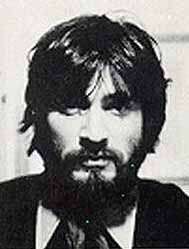 |
|
Terrence
Des Pres |
Terrence also
wrote, “A new appreciation of the problems of Israel comes to everyone.”
There is the parallel at work. Wallowing in genocides produces “ethnic”
pride, while hypocritically, these genocide studies ignore so many other
historic example of Man’s Inhumanity to Man, especially those committed by
the Armenians and, yes, the Israelis too.
I guess this is why there are so many Jewish genocide scholars who blindly
follow in step with the Armenians’ distorted version of history. It’s
repulsive.
Over half a million Turks were systematically murdered by the Armenians, with
a little help from the Russians, in the events around WWI. For roughly a
century prior, five million Muslims were displaced mainly by the actions of
Imperial Russia kicking the “Sick Man” around…. and five and a half
million were killed. Is there any Turkish person in existence who says,
boo-hooo? I don’t mean in the sense the knowledge is not painful; of course
it is. That is, most Turks aren’t even aware of these numbers. Those who
come across such facts say, “That stinks!” … and then they move on. No
Turk is going to relate to the sad fate of their forefathers as a source of
pride.
The date the Turkish-American community selected to represent their ethnic
pride parade was the birth of the Turkish republic when …. against all odds…
the Turks kicked out the imperial powers wishing to slice Turkey apart. The
date Armenian-Americans have selected is the signing of the relocation orders…
their date of “doom.” Over 2,000 years the Armenians have been around, and
they couldn’t think of something more positive?
Armenian historian Robert John (Hovhanes) said it best (The Reporter,
"America's Leading Armenian Newspaper," August 2, 1984):
"The Armenian, the Jew
or the African should not damage their development with a continual
conditioning of hate; neither should spurious guilt be vented upon others.
These negative preoccupations and obsessions are obstructing our evolution.”
|
Terrence Des Pres, like Vahan Cardashian, was another role model for Peter Balakian.
Exactly like Balakian, Des Pres was part of the English department at Colgate
University. It seems Des Pres then got depressed over the Holocaust, wrote a book
about it, and became known as a “genocide scholar.” Balakian too allowed himself
to get depressed over the Armenian “Genocide,” and by writing “The Burning
Tigris” can now be called a “genocide scholar,” as well.
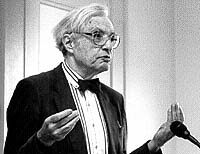 |
|
Robert
Jay Lifton |
When Des Pres died, "Professional Ethicist" Robert Jay Lifton gave a
talk at Colgate. Lifton and Eric Markusen collaborated in the 1980s. When Peter
Balakian decided to go on his crusade to defame Dr. Heath Lowry, the other two
gentlemen (along with Roger Smith) came up with a paper partially and ironically
entitled “Professional Ethics,”
which Balakian cites in his book. And the reader thinks, wow, look at all of these
distinct, individual voices who are coming down on Lowry. Heath Lowry must be a
crook.
Just like the distinct, individual voices who were coming down on the Ottoman
Empire. However, a lot of these voices were shared, as Morgenthau, Bryce and Lepsius
all borrowed from each other. Afterwards, it appeared like these voices were
corroborating each other, when in fact, many of them originated from the same
sources.
|
| |
Peter Balakian found the following passage defending the
Turkish view “crude and obscene”:
(Regarding Armenian survivors’ testimony): “Carefully coached by their Armenian
nationalist interviewers, these aged Armenians relate tales of horror which supposedly
took place 66 years ago in such detail as to astonish the imagination, considering that
most of them are already aged eighty or more. Subjected to years of Armenian nationalist
propaganda as well as the coaching of their interviewers, there is little doubt that their
statements are of no use whatever for historical research.”
I’d have to say that makes for a lot of common sense. What is so “crude and obscene”
about the truth? (Oh… I forgot. It’s Peter Balakian.)
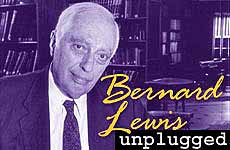 |
|
Bernard
Lewis |
Balakian then objects Bernard Lewis went with the familiar
Armenian figures in 1962, but then his attitude about the Armenians’ fate became “hostile.”
Since Peter Balakian is anything but a true historian, he needs to follow Bernard Lewis'
example as to what makes a true historian. In 1962, when only one version of the story was
omnipresent in America, Lewis had no reason to believe it wasn’t true. However, as the
real facts of the situation became apparent, Lewis did his duty as a historian: he “revised”
his facts. (2006 ADDENDUM: Dadrian tells us what turned Lewis around
was Gurun's "The Armenian File.") :Bernard Lewis was not married to a
cause; his only interest is historical truth. If the truth does not agree with what Peter
Balakian desperately prefers for us to believe, that is not being “hostile”; that is
being “honest.”
Balakian then similarly attacks Norman Itzkowitz and Stanford & Ezel Kural Shaw, whose
house was bombed by Armenian extremists in 1977. A passage is presented from the Shaws’
1970 book, presented for ridicule. They depict the regulations governing the Armenians’
safety:
Specific instructions were issued for the army to protect the Armenians against nomadic
attacks and to provide them with sufficient food and other supplies to meet their needs
during the march and after they were settled… The Armenians were to be protected and
cared for until they returned to their homes after the war. A supplementary law
established a special commission to record the revenues being held in trust until their
return. Muslims wishing to occupy abandoned buildings could do so only as renters, with
the revenues paid to the trust funds, and with the understanding that they would have to
leave when the original owners returned. The deportees and their possessions were to be
guarded by the army while in transit as well as in Iraq and Syria, and the government
would provide for their return once the crisis was over.
If Balakian were a true historian, he would have studied the many orders detailing these
safeguards… and every one of the ones presented in the passage was based on fact. Can
Balakian tell us why these orders were issued? Was it for the benefit of future
historians, a means to cover criminals’ tracks?
These orders prove the government’s heart was in its right place. The Ottomans were
simply not capable of following through. It was a desperate time for the bankrupt nation,
and when engaged in the colossal task of transporting hundreds of thousands of people …
things were bound to go wrong. The Ottomans were not known for their efficiency; up to
90,000 of their soldiers became “snow statues without firing a shot,” in Enver’s
disastrous campaign against Russia. General Liman von Sanders, as witness for the defense
in the trial of Tehlirian, testified as follows:
"...The economic situation was so dismal that not only many Armenians, but
thousands of Turkish soldiers as well died of the lack of food supplies, disease, and
other consequences of poor organization in the Turkish government. In my division alone,
after the battle of Gallipoli, thousands died of malnutrition."
Get this: these were Turkish SOLDIERS dying as a result of maladministration; the
soldiers, the only hope the nation had to counter decimation by heartless enemies. Add to
this chaos the inevitable opportunists and criminals, and corrupt local officials… that
was a recipe for disaster.
Did the Ottoman government bear a responsibility for not adequately taking care of the
Armenians? Most definitely. However, this was a desperate situation; Russia, who had
tormented the Sick Man for the last couple of centuries, was at the gates. Manpower and
resources were diverted around many fronts, Gallipoli in the east, and Mesopotamia in the
south. The treacherous Armenians chose this time to rebel. What would any nation have
done?
Did the Ottoman government also bear a responsibility for not adequately taking care of
the Muslims being massacred by the Armenians, a number that obscenely reached over half a
million? Most definitely.
Next, we move on to the Heath Lowry affair. It was a certainty for Balakian to bring up
this episode, as he was behind one major drive (if not THE drive) to attempt to discredit
the Princeton historian, in true Armenian fashion. (“The perpetrator attacks the
credibility of his victim.” A characteristic of criminal behavior.)
You can read more in this site’s Heath Lowry page.
A Princeton newspaper account mentions the following Balakian assertion:
Though no Ottoman historians have yet signed Balakian's petition, he says that's because
the historians fear reprisal from Turkey, and because "a group of so-called
Ottoman historians are simply lifelong recipients of Turkish government funds. Some of
them, like Mr. Lowry, are just not reliable historians."
It is ugly. It’s ugly how Balakian’s scruples may better be defined as
pooper-scruples. How in the world can he possibly claim “Ottoman historians are simply
lifelong recipients of Turkish government funds”? Who, for example? And where is the
proof? (2006 ADDENDUM: Here is the "proof," courtesy of smear tactician,
Israel Charny.):
And what of those who are not part of the group allegedly getting paid off… they “fear
reprisal from Turkey.” Exactly how would that reprisal occur? Would the historians have
their finger and toenails pulled out? Would horseshoes be nailed on their feet? Has Peter
Balakian lost himself in Armenian fairy tale land? (No. He is just exploiting the
well-entrenched image of Turkish barbarism his ilk has been so successful in perpetuating,
within the West.)
Thank God Dr. Lowry is not a reliable historian in the sense Peter Balakian is… no, Dr,
Lowry believes in maintaining an open mind, when he conducts his research.
How interesting that Ahmet Ertegun, the “Atlantic Records mogul,” provided half the
funding of a Princeton University chair. That part wasn’t mentioned in the press
articles (I’ve read) covering the Lowry affair. The reader was led to believe the entire
donation came from the Turkish government. (It might be possible Mr. Ertegun has
considerable sympathy for the Armenians… if so, this would be terribly ironic, that an
Armenian “friend” supported the establishment of a Turkish chair. Could it be possible
the establishment of Turkish studies has less to do with deceit than with finally shedding
some much neglected light in this Western-ignored area of history?)
(That proves further the difference between a Turkish chair and all the many Armenian ones
throughout America, like the one that has supported Richard Hovannisian for many years.
Turkish history has no agenda, and is only interested in the facts. How much importance
does Armenian history give to objective facts? Well, you get the idea from “The Burning
Tigris.”)
Funny how Mr. Balakian reports the “Lowry-Princeton-Turkey story had become national
news, and was covered in (the Armenian mouthpiece newspapers, among others) the New
York Times and the Boston Globe.” He refers to the petition (“Taking a Stand
Against the Turkish Government’s Denial of the Armenian Genocide and Scholarly
Corruption in the Academy”), but makes no mention that HE was the force behind this
petition. Peter Balakian can apparently be very humble.
What is really happening is that the people involved are all of the same singularly-voiced
gang, and Peter Balakian wants to make you think there are many distinct voices arriving
at their conclusions individually. (Not to say there aren’t those who make conclusions
individually… however, as with the case of the Ottoman-era missionaries who appeared so
honorable, what other conclusions are people going to reach if these similarly “honorable“
genocide scholars have banded together in a conspiratorial club?) If Mr. Balakian was
largely behind the drive to smear Heath Lowry, it is patently dishonest of him to bring up
the matter without revealing the depth of his own involvement.
Terrence Des Pres wrote, “What does it mean when a client state like Turkey can persuade
a super power like the United States to abandon its earlier stance toward the genocide of
1915?” I’m not exactly sure if the United States has “abandoned” its stance… the
powerful Armenian lobby controls too many American politicians… but should the day
arrive when that truth becomes respected, let us look at what that would mean: the
forsaking of a policy based on propaganda, lies and deceit, in favor of objective
historical facts. In other words, it would mean “honesty.” About time, too, given all
the defamatory petitions, resolutions, books, movies, newspaper reports, education
curricula throughout the years, wrongly blackening the image of the Turks.
Balakian laments the fact that two of the countless genocide resolutions polluting the
halls of the United States Congress throughout the years failed to pass. “It was a
simple commemorative bill that had no legal ramifications,” he sobs. I have news for
Peter Balakian: no resolution passed throughout the world regarding this matter has legal
ramifications. They are meaningless, representing the opinions of those who have voted for
them, swayed either by bigotry and/or through the plentiful bucks of the wealthy Armenian
Diaspora around the world.
The author tells us “the word ‘genocide’ had become the focus of Turkish hysteria.”
Let’s understand: “genocide,” the way the word is interpreted by laypeople as what
the Nazis did to the Jews, and not by foolish “genocide scholars” such as Samantha
Power (where practically any conflict can be called a genocide, rendering the word
meaningless), connotes the worst crime against humanity. If a genocide is unproven and yet
is mindlessly charged, who wouldn’t be hysterical? If Peter Balakian were accused of a
deplorable crime such as being a pedophile or a rapist, when he knew damned well he is
not, wouldn’t he be hysterical?
“The Turkish government was, in effect, conducting a campaign against American history.”
I find it tiresomely ironic that the Armenians commit one of their many affronts, and then
blame others for doing the same. The only ones involved in sneakily changing history are
the Armenians. Ignorant school boards throughout the American nation have been persuaded
to adopt the unproven Armenian “Genocide” into their curriculums.
|
|
The author helpfully provides a list
of nations issuing apologies for crimes in their past. Why no atonement from the
Turks? The Turks acknowledge the Armenians have suffered. However, they know fully
well the Armenians' suffering only came about as a result of their treachery…and
the Turks acted as any other nation would have under the same circumstances. Taner
Akcam excepted, the Turks are also aware there was no state-sponsored plan for
extermination. The Turks also are fully aware the hypocritical Western world doesn’t
even pay lip service to the many Turks who were massacred by the Armenians. In order
for an apology to be forthcoming, there must be a reason.
If Peter Balakian is so interested in an apology, he ought to realize apologizing is
a two-way street. The Armenians systematically wiped out over half a million
Muslims. Are these lives no less meaningful than the 300,000-600,000 Armenians
killed from all causes combined?
And what will happen after the apology? Will the Armenians then have “closure,”
and erase the hatred from their hearts? I’d say an apology would present grounds
for an “opener.” The Armenians need the enemy to bind them together, first of
all. Secondly, the next step would be demanding reparations, and land. The Germans
have given billions in reparations to the Israelis, a lot of Germans are wallowing
in guilt, and the main way the American media still portrays Germans is when they
say “Heil.” (If a genocide is ever proved, I’m not saying Turkey should not
apologize. However, that’s exactly the point. A genocide simply has not been
proven. If anyone from the two sides acted in a systematic way to try and
exterminate the other, it was the Armenians.)
Peter Balakian brings up a recent resolution that almost made it through Congress,
before President Clinton nipped it in the bud. “The only silver lining in the
story of H.R. 398 was that there was not any demonstrable denial on the part of the
American politicians.” That is true, but the reasons had nothing to do with
historical truth; the dirty details may be learned here.
Balakian then outlines the passing of the French Armenian “Genocide” resolution
“into law.” (Law? Now that this has become “legal,” will France arrest
Turkey?) France is a nation with half a million Armenians, second only to the United
States in Armenian influence. (Third might possibly be Armenia.) This resolution was
voted upon when only about a tenth of the Assembly members were present. When the
time came for the French Senate to ratify the resolution, few of the French
politicians dared to vote against it… the Armenians in their country, like the
Armenians in America, are simply too wealthy and powerful. Countries where these
resolutions have passed that have no huge Armenian presence get through because the
Diaspora Armenians in these nations energetically put their resources into these
bills… and nobody knows or cares about the Turkish side. These resolutions have
nothing to do with the truth. However, truth is a four-letter-word with too many
Armenians, when it comes to their beloved, identity-affirming genocide.
The author closes with a poem from one of Turkey’s greatest poets, Nazim Hikmet (“Evening
Walk,” 1950):
The Armenian citizen has not forgiven
the slaughter of his father in the Kurdish mountains.
But he loves you,
because you also won’t forgive
those who blackened the name of the Turkish people.
If Peter Balakian wishes to point to a Turkish source who would be influential among
Turks and not among Westerners (where Taner Akcam does a good enough job to impress
the unwary as a so-called “Turkish historian”), I’d recommend he go with Nazim
Hikmet. However, Nazim Hikmet was mistaken on two counts. He was certainly right
about the name of the Turkish people having been blackened, but Mr. Hikmet failed to
come up with the right culprit.
The second error Nazim Hikmet made was in regards to the Armenian loving the Turks…
although Mr. Hikmet was on the right track by asserting if an Armenian were to love
Turks, it would be for the vindictive reason stated. That is not the kind of love
Jesus Christ would have approved of.
Balakian the poet should be the first to realize (especially with “The Burning
Tigris” providing such incredible evidence), poets usually don’t make very good
historians.
Poets feel with their hearts. A historian needs to be dispassionate,
and scientific.
|
| |
|
|